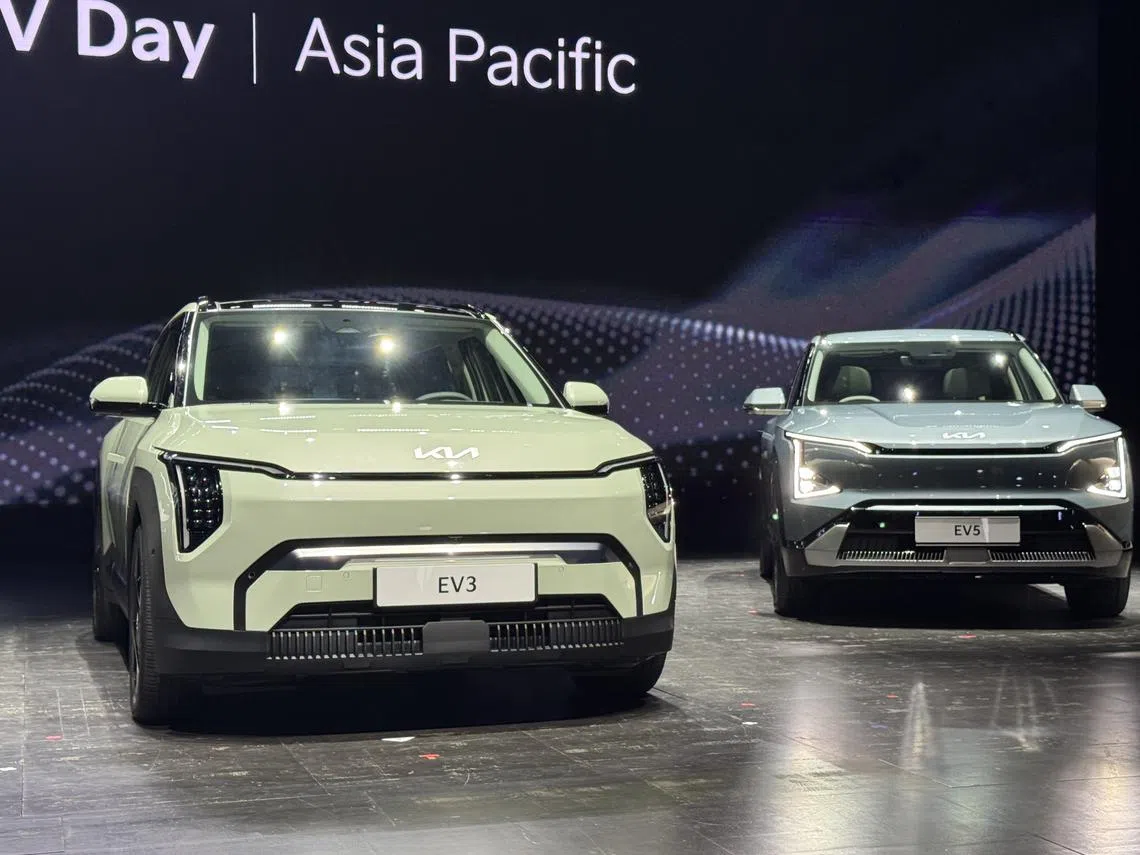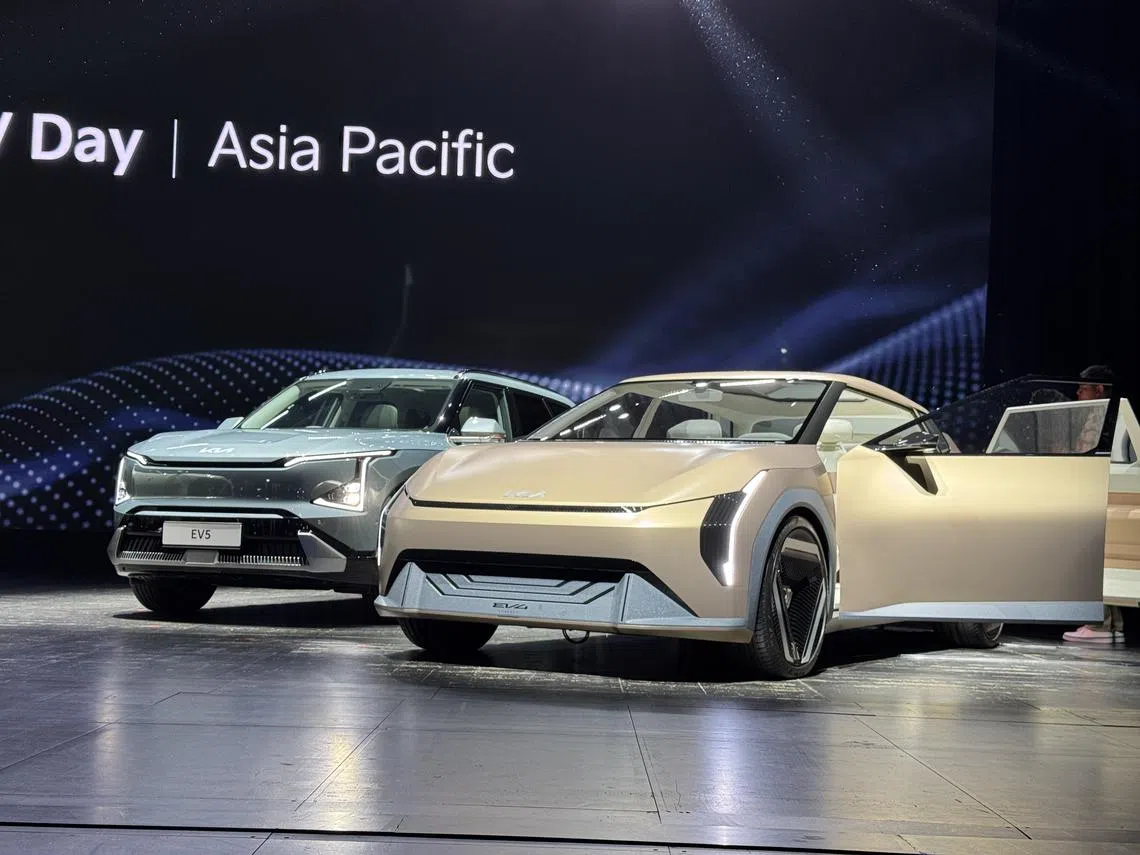Kia unveils its plan to beat ‘difficult’ Singapore EV market
The Korean carmaker reveals a range of sub-S$200,000 models at a media preview
[TAIPEI] In a bid to play catch-up in the race for electric vehicle (EV) sales in Singapore, Kia Motors plans to roll out more affordable models. At Kia EV Day in Taipei, the first regional edition of an event to give the press a close look at upcoming cars and talk to senior executives, the Korean automaker showed off EVs that will be priced under S$200,000, inclusive of Certificate of Entitlement (COE), when they arrive in 2025.
Despite having a three-model EV line-up in Singapore, Kia has struggled to gain traction here. According to Land Transport Authority (LTA) figures, the brand sold just 49 EVs in the first 10 months of 2024, a tiny share of the more than 11,000 electric cars registered here in the same period.
Ahn Ki-seok, president and CEO of Kia Asia Pacific, called Singapore a “very difficult market” due to its taxation system, which makes cars here among the most expensive globally.
Kia’s flagship EV9 has been a case in point. Although the model received accolades worldwide, its list price of S$289,999 without COE puts it in direct competition with offerings from premium marques like BMW and Mercedes-Benz, making it a tough sell for status-conscious Singapore buyers.
In response, Kia is pivoting its focus towards mass-market models designed to appeal to a broader base of customers.

The first of these to go on sale here will be the EV5, a midsize sport utility vehicle (SUV) designed to take on the likes of Tesla’s Model Y. The EV5 features a spacious interior and a 513-litre boot, and is equipped with many of the same advanced driver-assistance systems found in the flagship EV9, including a similar cabin layout.
Navigate Asia in
a new global order
Get the insights delivered to your inbox.
Sources from Cycle & Carriage Kia, the brand’s local distributor, told The Business Times it plans to introduce the EV5 at a competitive price point below S$200,000 with COE when it debuts at the Singapore Motor Show in January 2025.
Helping to keep the price low is the fact that Kia will manufacture a detuned version eligible for the cheaper Category A COE, which applies to EVs with a power output of 110 kilowatts or less. BMW, BYD, Hyundai, Tesla and others have used the same strategy to boost sales of their own EV models here.
Kia also aims to keep pricing low by offering both short-range and long-range variants of its new models. Short-range versions are less costly due to their smaller batteries, which are the most expensive component of an EV. Nonetheless, even the short-range EV5 will deliver a range of over 400 km on a single charge.
For thrill-seekers, a dual-motor, all-wheel-drive variant of the EV5 will pack 308 horsepower and deliver a zero to 100 kmh sprint in a sporty 6.1 seconds.
Kia’s product expansion will also include the EV3, set to become the brand’s most affordable EV when it joins the line-up here in the third quarter of 2025. Positioned below the EV5, the EV3 is a compact model aimed at younger buyers while still catering to families with five seats and a 460-litre boot.
Though its launch is too far away for Singapore pricing to be finalised, the EV3 is also likely to be optimised for Category A, putting it in direct competition with BYD’s Atto 3, far and away the top-selling EV here.
Kia also offered a glimpse into its future line-up with two concept vehicles scheduled for release in 2026.

The first is the EV4, a sleek fastback that is still a concept car. Aimed at executive buyers – think Korea’s futuristic, electric answer to the BMW 3 Series – the EV4 will be available in both short and long-range versions, and could also be tuned for Category A. If the concept car’s striking design makes it into the production version, it could give Kia one of the most head-turning cars in the segment.
The second concept, the PV5 (whose name alludes to its being a “purpose-built vehicle”), has a modular design that lets it be configured as a minibus, pickup truck or panel van. Kia is collaborating with Uber on creating a version optimised for ride-hailing, and is working with Motional, a tie-up between Hyundai Motor Group and automotive supplier Aptiv, to develop a robotaxi version.
When asked about the brand’s market share expectations, Ahn declined to provide specific projections but expressed optimism about the new strategy. “Today, you saw that we will expand our product line-up to the more affordable level of vehicles, which should help us grow our market share in Singapore,” he told BT.
Kia’s broader goal is to sell 1.6 million EVs annually by 2030, as part of its forecast that the global EV market will reach 36 million units a year. Whether those sums turn out to be right, Kia’s calculations about needing cheaper models in Singapore are likely to be spot on.
Decoding Asia newsletter: your guide to navigating Asia in a new global order. Sign up here to get Decoding Asia newsletter. Delivered to your inbox. Free.
Copyright SPH Media. All rights reserved.

